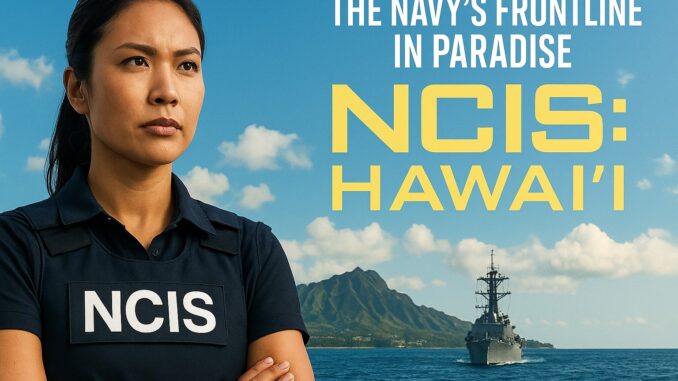
When most people picture Hawai‘i, they imagine bright blue oceans, endless sunshine, and the easy rhythm of island life. But NCIS: Hawai‘i flips the postcard image on its head, pulling viewers into a world where paradise sits right on the edge of geopolitical tension, military strategy, and high-stakes defense operations.
The series doesn’t just entertain—it exposes the real dangers, modern threats, and evolving challenges the U.S. Navy faces across the Pacific. Through gripping cases, layered characters, and real-world military complexities, NCIS: Hawai‘i shows what it really means to protect America’s frontline from the middle of paradise. Let’s explore how the show brings modern defense issues to life with intensity, authenticity, and a surprising emotional depth.
Hawai‘i—A Paradise Built on Strategic Importance
Hawai‘i holds a unique place in U.S. defense strategy. With Pearl Harbor, the Indo-Pacific Command, and countless military installations, the islands are more than a tropical destination—they’re a defensive giant.
The Show’s Accurate Portrayal of Military Geography
Unlike many crime dramas that gloss over real-world logistics, NCIS: Hawai‘i leans heavily into the critical role Hawai‘i plays in modern naval intelligence, cyber defense, and foreign surveillance.
Why Hawai‘i Is the Pacific’s First Line of Defense
The Pacific is a hotspot for:
-
Cyber manipulation
-
Territorial disputes
-
Intelligence breaches
-
Maritime piracy
-
Aggressive foreign military expansion
The show reflects these realities with storylines rooted in today’s global tensions.
Team Tennant—Breaking Ground with a New Kind of Naval Leadership
Special Agent Jane Tennant leads with grit, grace, and a leadership style that redefines what it means to command in a modern defense environment.
The First Female Lead in the NCIS Universe
Tennant brings a refreshing change—balancing authoritative command with emotional intelligence. Her leadership mirrors real-world shifts within U.S. defense agencies, where collaborative strength is becoming as important as traditional hierarchy.
Tactical Intelligence Meets Human Compassion
Tennant’s character shows how modern military operations must be:
-
Adaptable
-
Digitally aware
-
Strategically flexible
-
Emotionally grounded
A Leader Shaped by Place
Hawai‘i’s cultural diversity and military presence sculpt Tennant’s approach—one that considers people first, but never at the cost of national security.
The Hidden Warfare of the 21st Century
Modern defense is rarely about physical battles. NCIS: Hawai‘i brings lesser-known threats into the spotlight.
Cyber Warfare and Digital Espionage
Today’s enemies don’t always carry weapons—they carry laptops. From hacked satellites to compromised naval databases, the show highlights the silent wars fought behind screens.
Drone Technology and Surveillance
Several episodes tackle:
-
Drone misuse
-
Military testing gone wrong
-
Aerial surveillance operations
These reflect real issues the Navy navigates daily.
The Rise of Non-Traditional Adversaries
Terrorist cells aren’t the only threat. The show incorporates:
-
Rogue contractors
-
Undercover specialists
-
Foreign infiltrators
-
High-tech criminals
This mirrors modern reality, where anyone with enough resources can create chaos.

Protecting Paradise—Environmental & Oceanic Crime
The Pacific Ocean is a massive battlefield for environmental defense, and the show doesn’t shy away from these challenges.
Illegal Fishing and Maritime Piracy
These aren’t just economic issues—they can destabilize entire regions. The series sheds light on how naval intelligence combats such threats.
Underwater Sabotage
The show explores underwater:
-
Research theft
-
Sabotage attempts
-
Covert military testing
These storylines highlight the Navy’s role in securing vital ocean resources.
Cultural Sensitivity and Real Community Impact
NCIS: Hawai‘i respects the cultural heart of Hawai‘i—something rare for mainstream productions.
Blending Naval Protocol with Island Culture
Episodes often highlight:
-
Local customs
-
Family traditions
-
Native Hawaiian values
This balance is essential for military operations on the islands, where respect for heritage matters just as much as tactical execution.
The Team’s Connection to Community
The characters aren’t outsiders—they’re part of island life. Their interactions emphasize:
-
Trust
-
Understanding
-
Collaboration
This creates a more genuine portrayal of Hawai‘i’s social landscape.
Humanizing the Navy’s Everyday Heroes
Combat boots, tactical gear, and high-tech gadgets make great TV—but NCIS: Hawai‘i goes deeper.
Characters with Real Emotional Stakes
The team deals with:
-
Family crises
-
Personal sacrifice
-
Competitive pressures
-
Identity conflicts
Each case forces them to confront who they are as much as what they do.
Balancing Duty and Personal Life
The show reflects a real struggle for military families—maintaining relationships in a world filled with danger and unpredictability.
Teamwork and Trust—The Core of Naval Intelligence
Complex cases require unified execution.
Each Member’s Expertise Matters
The series highlights how modern defense isn’t about one hero—it’s about many specialists working together:
-
Analysts
-
Forensic experts
-
Field agents
-
Technology specialists
-
Military liaisons
Internal Conflicts Reflect Real CIA–NCIS–DoD Dynamics
Inter-agency tension is portrayed with realism, showing viewers the delicate balancing act behind national security.
The Show’s Real-World Impact
NCIS: Hawai‘i isn’t just entertainment—it shapes public perception.
Inspiring Future Generations
The portrayal of strong leadership, diverse representation, and advanced military problem-solving encourages young viewers to explore careers in:
-
Naval Intelligence
-
Cybersecurity
-
Federal law enforcement
-
Military sciences
Raising Awareness of Pacific Tensions
The show spotlights geopolitical issues that often go unnoticed—bringing global awareness to the Pacific’s emerging challenges.
Conclusion
NCIS: Hawai‘i isn’t just a tropical spin-off—it’s a bold, modern, and deeply relevant exploration of today’s naval defense landscape. By blending real-world threats with deeply human storytelling, the series transforms Hawai‘i into a frontline battleground where heart, honor, and high-tech intelligence collide.
It shows us that paradise isn’t always peaceful—and those who protect it face dangers far beyond the shoreline. Through its characters, cases, and cultural authenticity, NCIS: Hawai‘i captures the very essence of what it means to defend America’s frontline in an ever-changing world.